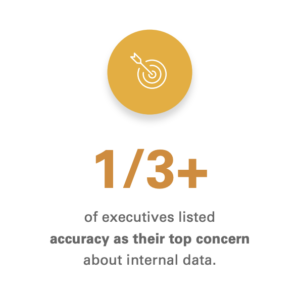The pharmaceutical industry has long faced something of a perfect storm of regulatory upheaval and technological disruption. But now is different. The Inflation Reduction Act represents a unique challenge for pharma companies as the U.S. government can force them to negotiate drug prices for some Medicare drugs. And despite its name, some pundits believe the legislation will have minimal immediate impact on inflation. The Congressional Budget Office estimates that the proposal will change the inflation rate by less than one-tenth of a percent over the next two years, either positively or negatively.
With so much at stake and uncertainty surrounding the IRA’s true impact, we sat down with Jesse Mendelsohn, SVP at Model N, to discuss the findings of the new “2024 State of Revenue Report” on the evolving landscape of pharma revenue management.
What are the top challenges in managing customer and membership data?

[From the Revenue N “2024 State of Revenue Report”]
Mendelsohn: The research found that 95% of executives struggle to manage membership-related data, with top issues being data accuracy and maintaining data.
Outdated and inaccurate customer data leads to all kinds of revenue and compliance risks, such as pricing errors, inaccurate chargeback and rebate payments, strained customer relationships, and issues with government reporting. More than just an operational headache, poor data quality can directly impact a pharma company’s top and bottom lines.
To overcome this, pharma manufacturers need to consider integrated data management solutions that enhance master data quality through connectivity with third-party data sources. Seamlessly integrating customer master data with pricing, contract management, and provider management systems is key to ensuring accurate data alignment.
Why has concern about IRA’s impact on revenue management programs increased?
Mendelsohn: The spike in pharma executives expecting the IRA’s Medicare drug price negotiations to have a major impact on revenue management programs likely stems from the reality that those provisions are no longer hypothetical. With negotiations now underway, companies can begin to clearly see the potential financial ramifications across their product portfolios.
Beyond drugs directly subject to Medicare’s new “maximum fair prices,” competitors anticipate spillover effects like downward pricing pressure in that channel. The caps also change the economics around launching new products, generics/biosimilars, and certain R&D investments.
 [From the Revenue N “2024 State of Revenue Report”]
[From the Revenue N “2024 State of Revenue Report”]
This has forced a fundamental rethink of commercial strategy and revenue management approaches. Pharma companies must now deeply consider factors like Medicare channel participation, launch timing/pricing, and offsetting revenue shortfalls elsewhere.
Pharma is rapidly investing in technology to navigate this new landscape – a signal that IRA’s Medicare provisions have prompted a major strategic priority shift in 2024.
The report mentions 94% of pharma companies are preparing revenue management programs for regulatory changes. What were the most common approaches cited?
Mendelsohn: In 2023, only 40% of pharma companies were preparing their revenue management programs for regulatory compliance, and 45% were more concerned about financial controls.
This year, the top strategies for preparing for regulatory changes are implementing technology solutions, outsourcing the work, and dedicating internal teams. Ultimately, an integrated strategy that combines technology platforms, outsourced services, and industry-specific regulatory intelligence is key for pharma companies to navigate the onslaught of new federal and state pricing rules, reporting requirements, and financial controls they are facing in 2024.
Pharma companies were the most likely to “always” use spreadsheets for revenue management at 41%, an increase from last year. Did the research reveal why spreadsheet usage went up despite availability of purpose-built technologies?
Mendelsohn: Pharma companies still using spreadsheets for revenue management are putting themselves at significant risk of human errors, lack of auditability, and the inability to integrate with modern data sources and analytics tools.
Companies are struggling to overhaul their data management practices, which is why many still rely on manual methods. However, modern revenue platforms tailored to pharma’s unique pricing, contracting and compliance requirements systematically enhance data quality and integration, laying the groundwork for leveraging AI and advanced revenue analytics.
Adopting these solutions positions pharma companies for optimized revenue performance and competitive advantages over those still burdened by spreadsheet-driven operations. A strategic investment is warranted given the high stakes.
66% of pharma companies are turning to technology to ensure compliance with state price transparency reporting. What types of solutions are they implementing? Are companies taking a state-by-state approach or aiming for a more holistic strategy?
Mendelsohn: It’s no surprise that two-thirds of pharma companies are implementing technology to address state drug pricing transparency laws. These reporting mandates are rapidly expanding, so companies need a unified solution that can consolidate all their data sources and handle multi-state reporting holistically.
Pharma companies should look for the following capabilities in these solutions:
- Ability to centrally configure and manage all the varying rules, data requirements, formats, and deadlines across different states in a single repository that can be continuously updated.
- Automated report generation capabilities that can trigger reports based on each state’s specific events/thresholds and produce reports in the mandated formats.
- Integration with internal data sources to pull required information into the reports accurately.
- Auditing and record-keeping functionality to track all reporting activity and reproduce previous reports for compliance evidence.
What-if analysis to model potential impacts of future pricing/product events on reporting requirements.
40% of pharma executives are concerned the Inflation Reduction Act will impact revenue management, while 44% are worried about Medicaid changes. What’s your take on that?
Mendelsohn: Rather than evaluating federal and state policy changes in silos, pharma executives are seeking revenue management technology platforms that can cohesively model and execute pricing/compliance strategies spanning the regulatory inputs from IRA, MDRP, price transparency laws, and more. An integrated approach is crucial as they navigate the collective disruption across their government payer/program businesses.
This article was originally published on drugdiscoverytrends.com.












